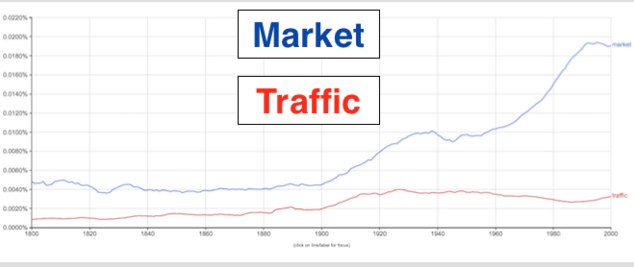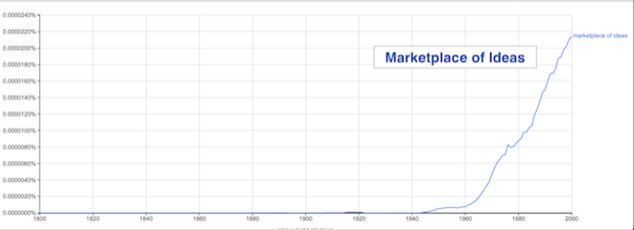-
 BC
13.2kDissent Magazine had an interesting piece questioning what people (economists, policy wonks, philosophizing kibitzers, neoliberals, conservatives, socialists...) mean when they say "The Market". An answer was not provided. The columnists just pointed out that "The Market" has no particular meaning, no objective definition, no limiting conditions, etc. One could say that "The Traffic System" reacted negatively to Brexit, Trump's nomination, Zika, or well-head oil prices.
BC
13.2kDissent Magazine had an interesting piece questioning what people (economists, policy wonks, philosophizing kibitzers, neoliberals, conservatives, socialists...) mean when they say "The Market". An answer was not provided. The columnists just pointed out that "The Market" has no particular meaning, no objective definition, no limiting conditions, etc. One could say that "The Traffic System" reacted negatively to Brexit, Trump's nomination, Zika, or well-head oil prices.
-
The meaning of “market” has expanded to cover many aspects of our lives, and become more abstract in the process. As early as 1928, people started talking about a “marketplace of ideas.” By the 1970s, “the market” meant “the competitive free market; the operation of supply and demand;” in the same decade, historian Daniel Rodgers tells us, market metaphors became detached from history and institutions. The market had become a “metaphor for society as a whole.” In the 1980s, Ronald Reagan praised the “magic of the marketplace,” and by the 1990s, “the market” sounded like a democratic utopia.
We could use "Traffic" as an alternate, almost universal and vague determinant. We are all always part of traffic: vehicular traffic, pedestrian traffic, freeway traffic, internet traffic, telephone traffic, drug traffic, cable traffic, cash flows, bad traffic, air traffic, freight traffic, white slave traffic, little traffic (aka good traffic), traffic in new ideas, and so on. Nobody has defined "Traffic" either, so the term is AVAILABLE.
The FINANCIAL TRAFFIC WAS SLOW TODAY. TRAFFIC SCREECHED TO A HALT IN THE 2007 BUMPER-TO-BUMPER STALL OUT. THE TRAFFIC IN BRIGHT NEW IDEAS IS HEAVY (or dead).
What do you mean when you use the term "The Market". -
 BC
13.2k
BC
13.2k
I made an addition or two to the article. Your definition is one that many people would suppose to be the case. But in political discourse, (or traffic, or in "the political marketplace) "markets" mean something more, less, and other than mere "exchange of goods and services through the use of money". -
 apokrisis
6.8kThe simplest definition would be a common place for free exchanges.
apokrisis
6.8kThe simplest definition would be a common place for free exchanges.
So traffic is different in that while it is an emergent effect of many individual actions, it is not itself a common good, nor are the exchanges particularly volitional. Traffic is something to be avoided, or at least managed in the common interests to minimise the need for the negotiated interactions (like which side of the road to drive on).
And of course the social benefits of free markets is something that the "free marketeers" like to claim for the right. Which is a little ironic.
What makes a fair marketplace is strong regulation - whatever it takes to remove barriers to informed action in the marketplace. The alternative is the rigged market or unlevel playing field. :) -
 Wayfarer
20.7kThe difference between the market and traffic, is that the former has connotations of persons meeting for an exchange of goods and services. So it exists for a reason or purpose external to itself, not simply as a consequence of other actions, such as the movement of vehicles as is the case with 'traffic'.
Wayfarer
20.7kThe difference between the market and traffic, is that the former has connotations of persons meeting for an exchange of goods and services. So it exists for a reason or purpose external to itself, not simply as a consequence of other actions, such as the movement of vehicles as is the case with 'traffic'.
(There is, I suppose, the other meaning of 'traffic', as in 'trafficking' - usually applied to contraband - but I don't think this is what you had in mind. I remember when I was a teen, and the band Traffic suddenly became famous - my parents exchanged knowing glances when they heard the name.)
In terms of the ideological importance of the market, surely one of the defining ideas is the idea associated with Adam Smith, 'the invisible hand'. 'The idea of trade and market exchange automatically channeling self-interest toward socially desirable ends is a central justification for the laissez-faire economic philosophy, which lies behind neoclassical economics' (or 'market economics'). This thinking has been profoundly influential on economic theory, hence Reagen's appeal to it.
I think the 'marketplace of ideas' uses the term in a more metaphorical sense. -
 BC
13.2kThe exchange of goods and services through the use of money. — Thorongil
BC
13.2kThe exchange of goods and services through the use of money. — Thorongil
The "Longfellow Market" sells groceries in exchange for money.
I don't generally use the term "market" to talk about a "store". To me "market" is a rather abstract term that names large impersonal forces, of the sort that can "freeze up" which is a catastrophe. In 2007 central banks acted to prevent this from happening by creating money. The theory is that if nobody trusted anybody else, an infusion of cash into the system would help. Maybe it did. Some places haven't really recovered 9 years later.
The market is operated by very large institutions and very rich individuals. Not just the stock market, which of course serves institutions and very rich individuals, mostly. But there are other markets: the Chicago Mercantile Exchange (The Merc), Nasdaq, exchanges around the world, and various financial institutions like the World Bank, International Monetary Fund, and so on. There are future markets, and markets on the fluctuating value of currencies.
I don't look at "markets" as some sort of conspiracy (I'll be the last one to find out, most likely) just very big and under no individual's thumb. The markets are everywhere, and in some senses, nowhere, or maybe better, everywhere at once. Markets are like "the climate". Everywhere, subject to influence, not under control. -
 jkop
677The market is the exchange of goods and services for money, which includes the process of establishing their prices.
jkop
677The market is the exchange of goods and services for money, which includes the process of establishing their prices.
But often in comments and interviews on economy on the news, for instance, 'the market' seems comparable to a medieval use of 'God'. Instead of priests telling us about 'God's will' there are economists or the like telling us what 'the market' demands, or else we will perish. The market is referred to as if it would be an omnipresent creature with its own inscrutable logic.
Welcome to The Philosophy Forum!
Get involved in philosophical discussions about knowledge, truth, language, consciousness, science, politics, religion, logic and mathematics, art, history, and lots more. No ads, no clutter, and very little agreement — just fascinating conversations.
Categories
- Guest category
- The Lounge
- General Philosophy
- Metaphysics & Epistemology
- Philosophy of Mind
- Ethics
- Political Philosophy
- Philosophy of Art
- Logic & Philosophy of Mathematics
- Philosophy of Religion
- Philosophy of Science
- Philosophy of Language
- Interesting Stuff
- Politics and Current Affairs
- Humanities and Social Sciences
- Science and Technology
- Learning Centre
- Resources
- Books and Papers
- Reading groups
- Questions
- Guest Speakers
- David Pearce
- Massimo Pigliucci
- Debates
- Debate Proposals
- Debate Discussion
- Feedback
- Article submissions
- About TPF
- Help
More Discussions
- Other sites we like
- Social media
- Terms of Service
- Sign In
- Created with PlushForums
- © 2024 The Philosophy Forum






